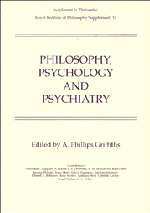Book contents
- Frontmatter
- Contents
- Preface
- Introduction: Just Getting Started
- Mind and Madness: New Directions in the Philosophy of Psychiatry
- Emotion and Memory: The Second Cognitive Revolution
- Meaning and Mechanism in Psychotherapy and General Psychiatry
- Making Sense on the Boundaries: On Moving Between Philosophy and Psychotherapy
- Mental Disorder, Illness and Biological Disfunction
- Integrity, Boundary and the Ecology of Personal Processes
- Multiple Personality and Computational Models
- Psychology and Politics: Lies, Damned Lies and Self-Deception
- Personal Identity and Psychiatric Illness
- Vices and the Self
- Wild Beasts and Idle Humours: Legal Insanity and the Finding of Fault
- Dangerousness and Mental Disorder
- Problems with the Doctrine of Consent
- Homosexuality
- Nietzsche and Music
- References
- Notes on Contributors
Wild Beasts and Idle Humours: Legal Insanity and the Finding of Fault
Published online by Cambridge University Press: 03 May 2011
- Frontmatter
- Contents
- Preface
- Introduction: Just Getting Started
- Mind and Madness: New Directions in the Philosophy of Psychiatry
- Emotion and Memory: The Second Cognitive Revolution
- Meaning and Mechanism in Psychotherapy and General Psychiatry
- Making Sense on the Boundaries: On Moving Between Philosophy and Psychotherapy
- Mental Disorder, Illness and Biological Disfunction
- Integrity, Boundary and the Ecology of Personal Processes
- Multiple Personality and Computational Models
- Psychology and Politics: Lies, Damned Lies and Self-Deception
- Personal Identity and Psychiatric Illness
- Vices and the Self
- Wild Beasts and Idle Humours: Legal Insanity and the Finding of Fault
- Dangerousness and Mental Disorder
- Problems with the Doctrine of Consent
- Homosexuality
- Nietzsche and Music
- References
- Notes on Contributors
Summary
So fearfully and wonderfully are we made, so infinitely subtle is the spiritual part of our being, so difficult is it to trace with accuracy the effect of diseased intellect upon human action, that I may appeal to all who hear me, whether there are any causes more difficult, or which, indeed, so often confound the learning of the judges themselves, as when insanity, or the the effects and consequences of insanity, become the subjects of legal consideration and judgment.
(From Thomas Erskine's address to the jury in Rex v. Hadfield)The reach of law extends only to those able to comprehend its terms and abide by its prescriptions. By this very logic, being human is not enough, for some human beings are so lacking in comprehension, so possessed by the ruling power of another, so destitute of personal powers of self-control as to be indistinguishable from infants, wild beasts or even mere tools. Ancient Greek and Roman law fully respected this, and thus provided legal defences based on claims of diminished capacity. Far from making a mockery of justice, therefore, as is sometimes claimed, the insanity defense is implicit in the very concept of justice. As early as Draco's homicide law one finds distinctions made between intentional and non-responsible homicides (Gagarin, 1981). Mitigation based on mental states, then, is as old as Western juridical thought itself.
- Type
- Chapter
- Information
- Philosophy, Psychology and Psychiatry , pp. 159 - 178Publisher: Cambridge University PressPrint publication year: 1995
- 4
- Cited by

